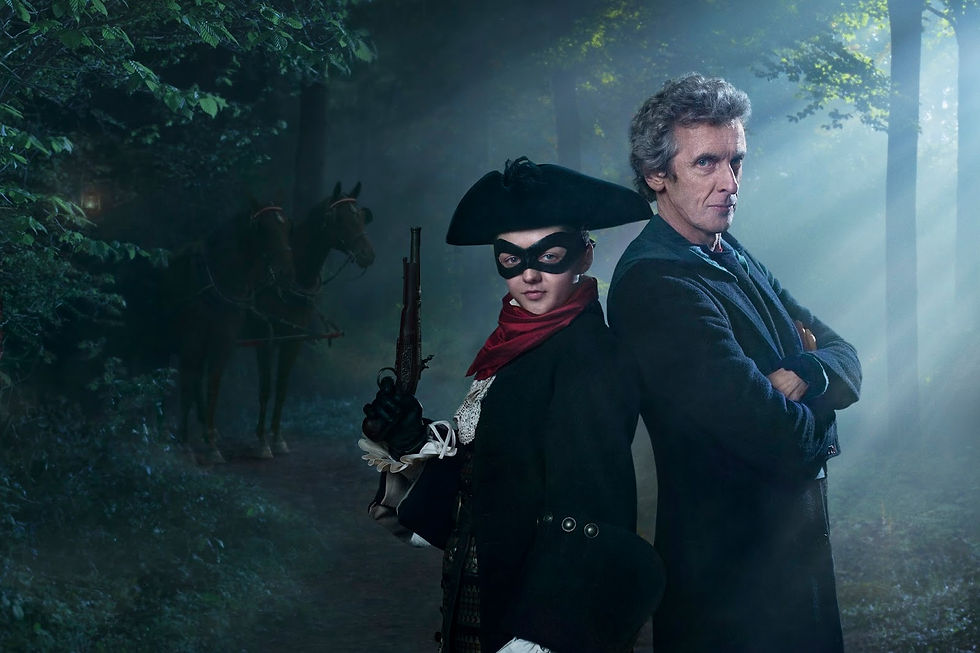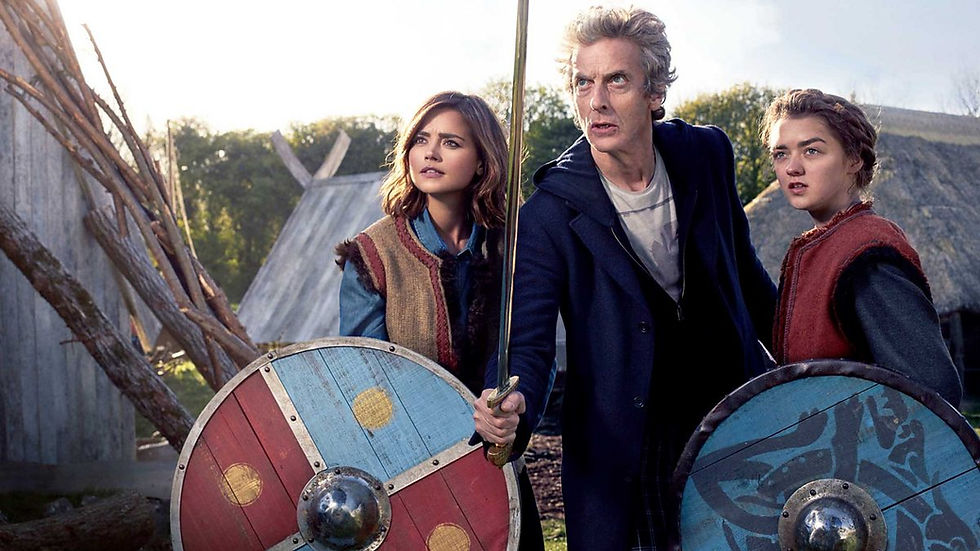Doctor Who Series 9, Episode 6 Review - The Woman Who Lived
- SimplyWho

- 5 days ago
- 4 min read
Updated: 3 days ago
What did you think of this episode?
Sonic!
Good!
Bumpy-wumpy!
Exterminate!
I really loved this series format. Perhaps two-parters with a series-long thread linking them all together could be a way forward for the show now? This was a two-part story, but it was also two completely different stories. The Woman Who Lived fast-forwards far away from The Girl Who Died and discusses a very Doctor Who subject: immortality. What does it really mean to live forever?
I'll say this early, the plot revolving around the alien villain, Leandro the lion-man thing, is pretty weak. His plan is forgettable and I’ve actually forgotten it already! I think it was... kill people? That’s not really what this episode is about, though, and it kind of gets in the way of the good stuff.
"Oh just ignore me, just passing through. Like fish in the night."
The episode is slow and perhaps it is maybe too slow at times. I got the sense it was aiming for atmosphere, but the lion-man always stopped that atmosphere in its tracks.
I don’t think I will ever not like something that has Peter Capaldi in, though. The man is a bloody hero.
Maisie Williams is bloody good as well, and it’s fun seeing the Doctor with someone other than Clara. The quiet, painful discussions between Ashildr (or 'Me' as she is now called) are what give this story its soul.
Ashildr has lived for centuries, and her journals are an amazing way to show this. So much tragedy and pain within them, showing her as a person who has stopped remembering her life because there’s too much of it. She’s grown distant from humanity because everyone she’s ever known is gone. And in that, she mirrors the Doctor in a way few characters have. Not just another companion, but someone who completely gets the man who regrets, and the man who forgets.

Loneliness is at the heart of this story. Ashildr is lonely. The Doctor is lonely. Both of them immortal (or as good as immortal) and both unable to fully connect with people who won’t last the distance. Their conversations are sad, sharp, and sometimes cutting. There’s a bitterness in Ashildr now, and the Doctor is unsure of himself because of that.
In many ways, this episode isn’t really about defeating a monster. Which is lucky, really, because the monster is rubbish. It’s about asking whether immortality is a gift or a curse and showing that the Doctor’s refusal to travel with someone like Ashildr is both out of kindness and fear. He knows what she might become, because he’s seen it in himself.
"I have waited longer than I should ever have lived. I have lost more than I can even remember. Please, Doctor, just get me out of this. I want more than this. I deserve more than this. Why not? Why not!"
I’m not slating this episode or series, but I can kind of see why the show lost a few viewers around this time. This is in no way because it’s rubbish, but the stories are slower, the content more mature. You still get a goofy villain or two, but this feels like the show growing up with the 2005 audience, and I guess it kind of restricted new viewers jumping in.
So, as some people dropped off to do other things, not as many hopped on to join the ride. Their loss!
This changed when Jodie came along, and a whole load of new viewers came to see a female Doctor. Viewers who had probably never thought about the show before. I’m sure I’ll discuss it more when the time comes to review Thirteen’s era, but for whatever reason, a lot of them dropped off again.
I’ve been wondering lately where the show would be if the Doctors had come in a slightly different order:
Eccleston – I can’t change this series; it feels like sacrilege. It was the rebirth, and it had to be him. A modern, grounded Ninth Doctor gave the show legitimacy and heart.
Tennant – I wouldn’t change this either. The formula worked. Doctor Who was everywhere. Family viewing, magazines, action figures. He was the Doctor who made the show 'cool' again. Tennant was very much the perfect Doctor at the perfect time.
Whittaker – Here's where I would shake it up though. Imagine her era coming next, when the audience was still growing and not yet divided by social media backlash and tribal fandoms. Her first series, full of optimism and curiosity, could’ve built on the popularity already in place - and reached even wider.
Smith – A return to a young, eccentric male Doctor would feel fresh again after Whittaker. The Eleventh Hour would wow people all over again. A fairytale reboot inside a reboot. His quirky energy would pull back any viewers who’d drifted.
Gatwa – A bold and modern reinvention, right at the moment the show wants to shake off its legacy weight. A new era with new energy.
Capaldi – Finally, a slower-paced, more introspective Doctor. In the streaming era, binge culture allows for deeper, less explosive storytelling. Capaldi’s darker, heavier episodes might have found a more appreciative and thoughtful audience here with viewers ready for a mature, character-driven take on the Time Lord.
Would this reshuffle have changed Doctor Who’s fortunes? Who knows. But it’s fun to imagine.
I’ve gone completely off topic here. Where was I?
Ah yes! The Woman Who Lived may stumble in plot and pacing, but it finds real emotional weight in its exploration of immortality. Forget the villain as this is Peter Capaldi and Maisie Williams putting in two great performances as a pair of lonely but very different people. It can plod a bit, and it has an odd lion-man, but it’s still a good episode of Doctor Who.
What did you think of The Woman Who Lived? Did you enjoy the two parters throughout this series? How would you shuffle the Doctors eras? Let me know in the comments below.
RATING: Good!
BEST LINE: People like us, we go on too long. We forget what matters. The last thing we need is each other. We need the mayflies. You see the mayflies, they know more than we do. They know how beautiful and precious life is because it’s fleeting.




Comentarios